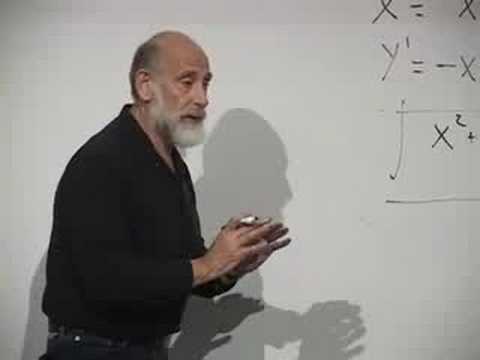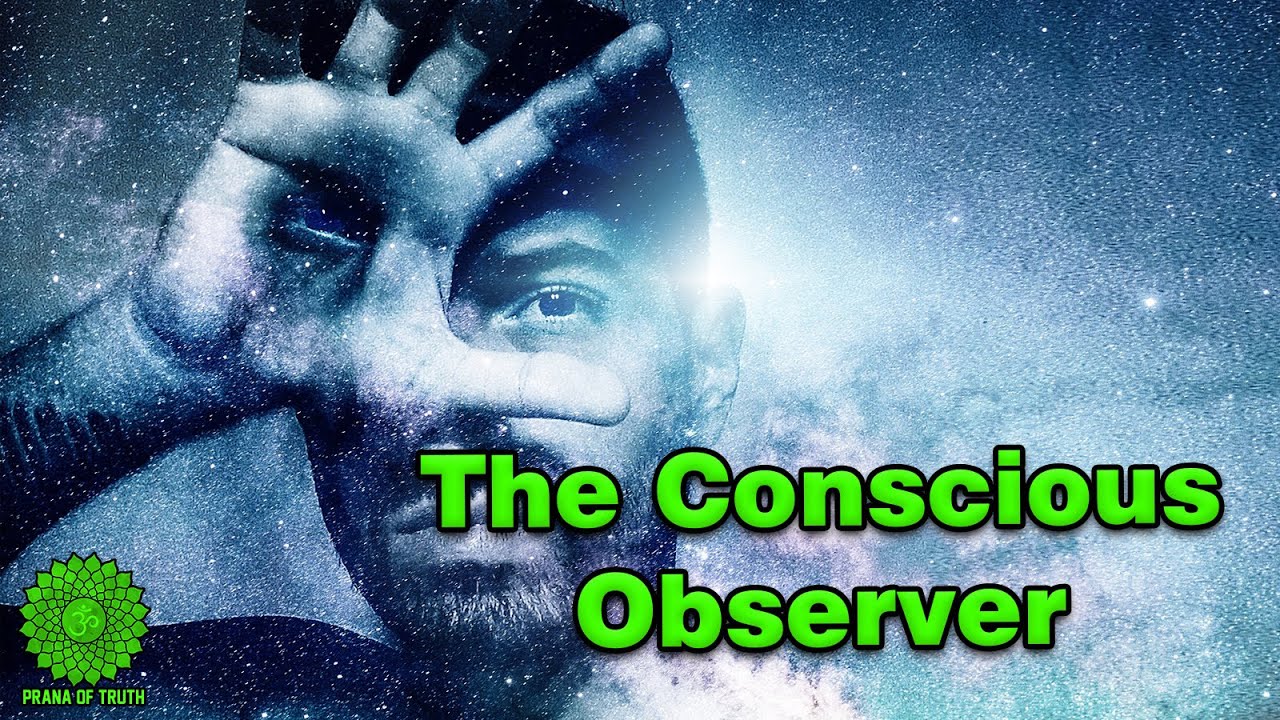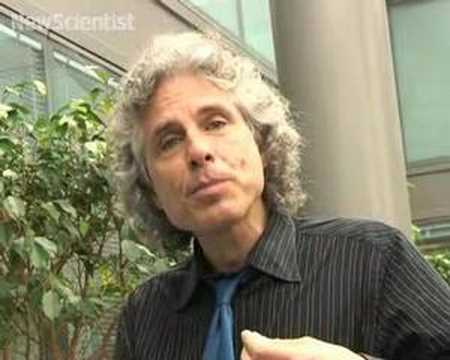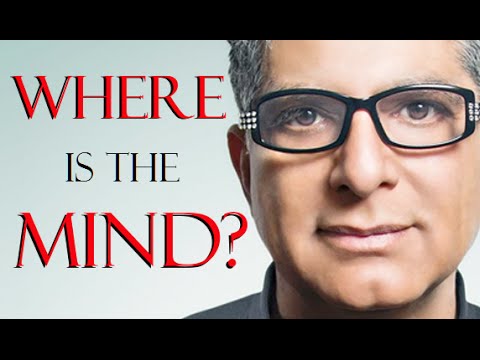Stanford
Lecture 1 of Leonard Susskind’s Modern Physics course concentrating on Special Relativity. Recorded April 14, 2008 at Stanford University.
This Stanford Continuing Studies course is the third of a six-quarter sequence of classes exploring the essential theoretical foundations of modern physics. The topics covered in this course focus on classical mechanics. Leonard Susskind is the Felix Bloch Professor of Physics at Stanford University.
Complete Playlist for the Course:
http://www.youtube.com/view_play_list?p=CCD6C043FEC59772
Stanford Continuing Studies:
http://continuingstudies.stanford.edu/
About Leonard Susskind:
http://www.stanford.edu/dept/physics/people/faculty/susskind_leonard.html
Stanford University Channel on YouTube:
http://www.youtube.com/stanford
Source




@ 1:29:30 someone notices that there's a non negligible adjustment to time dilation when "X" is very large. Had to pause the video and ponder on that for a second. Would that mean that two observers separated by a large distance would experience time dilation even if they had no relative motion? Of course not, right? The coordinates are arbitrary anyway so this shouldn't be the case. I'm sure I'm missing something about what X represents in this sense…
i am pretty sure when he gave this lecture he was not expecting an 8th grader to watch this but here we are
This kid is just asking questions so Leonard thinks he is smart lol
The Absurdity of Special Bullshit Relativity Theory youtu.be/JxzhoSWBtgw. The falsity of Einstein's thought experiments, the thought Light-Clock, Lorent's equations, and the interest of the Elite, a selected coterie, to impose their Relativistic-Chaos stuff in our educational system to manipulate, control, and exploit vulnerable people.
Although the constancy of the speed of light is usually an axiom, I prefer to think of it as a consequence of trying to represent time and space with the same units, so that they are the same thing, and assuming that in such units there is interchangeability in the equations of physics, which means there is symmetry with respect to the bisector, which represents a point moving at speed c. So c is the same in every reference frame. And if we assume space and time are the same, it makes no difference to invert the space and time axes. So a particle moving at speed V>c is perceived as a particle moving at speed v<c: each frame has two axis, and we can't decide which axis is space and which axis is time. The one representing motion at v<c (the one in the time zone) is a time axis, and represents the motion of the frame. The other representing motion at V>c (the one in the space zone) is its space axis, and represents its present. So no motion at speed V>c represents a moving particle, because it simply becomes the set of events representing the present of the particle, therefore causally disconnected from the particle. The actual particle is always that one in the time zone.
such a helpful lecture learned much from this lecture
I could listen to Professor Susskind for days. I even started walking like him. He's a brilliant man. I can't match his knowledge of relativity and string theory, but even I know you can't see sound 👉🏾[ 1:02:01 ]. No disrespect, but I know my five senses very well.
I won’t explain inertial reference frames any further, except…
proceeds to describe inertial reference frames in great detail
Sir jii you are the great❤️
am i the only one that likes to fall asleep to this . makes me comfortable
Very interesting and very nice
58:00
I cannot believe that this respectable professor goes with the student argument that x' is bigger than x to modify the equations! A little more rotation of the second frame in either direction will make that argument go down the drain. The coordinates in the new frame are found by simply knowing that the unit vectors of the original frame are multiplied by e(jΘ) and concluding that x' = xcos(Θ) + ysin(Θ) and y' = -xsin(Θ) + ycos(Θ)
Y his mouth sound like that 😂😂
Ship1 at rest on top:
T——————–N
<—– N———-T
Ship2 at rest at bottom:
T———-N —–>
N——————–T
Here we have 2 ships passing each other and each diagram shows one of the ships at rest and the other one moving and length contracted. There is 1 moment when T of ship1 is lined up with N of ship2. This moment must be the same moment for both ship1 and ship2. If it isn't the same moment for both T of ship1 and N of ship2 then that means that T of ship1 is located somewhere else, according to ship1, when, according to ship2, T of ship1 is lined up with N of ship2, which means that T of ship1 has already passed or will pass N of ship2 so that is 2 events of T of ship1 passing N of ship2 which is clearly impossible. It also means that T of ship1 is simultaneously in 2 different places which is impossible. So this proves that the moment that T of ship1 and N of ship2 is lined up is the same moment in both the reference frame of ship1 and the reference frame of ship2. At this moment N of ship1 is located on opposite sides of T of ship2 simultaneously which is clearly impossible.
whats the difference between this playlist and the one that cam out in 2012… why are there 2 different lectures by the same person on the same topic
Who's watching in 2020 during quarantine?
Thanks for inspiring people to pursue science. We need more professors like him.
The work i do has absolutely nothing to do with physics but I still enjoy watching this infinitely more than CNN.
I consider him my mentor even if he doesn't even know me. You're amazing, Leonard.
Dear Dr. Susskind: Open http://www.beourbest.com to see the TRUTH about how to create Einstein’s relativity together with mass increment and time dilation in the invisible world of time, and also about how to create E=MC2 in the visible world of space. What is truth is “easy to know and simple to follow” (a phrase in I-Ying) and, according to AMERICAN KING JAMES VERSION, it “will make you free”.
Open http://www.beourbest.com to see the TRUTH about how to create E=MC2, how to create Einstein’s relativity together with mass increment and time dilation
Vladimir Putin teaching Physics.
Peera manam dy..😍
Ayt ye calisicaktim burasi neresi abv
Great Class https://psctopper.com/physics/physics-fundamentals/222/
Are the lectures available on DVD or other media
Great
He means d of (t squared)- d of (x squared) right?.
THANK YOU
Plz provide the link lecture notes if there are
I love the way he is eating in all his lectures.
Burda ne arıyom ÖSYM senin yuzunden
I am coincidentally watching this on Susskind's birthday 2019.
Literally
https://chrome.google.com/webstore/detail/threelly-ai-for-youtube/dfohlnjmjiipcppekkbhbabjbnikkibo
The Great Physicists' Road Trip by Ms. Rachel C. Millison
Great physicists from the past decide to return to Earth for one last road-trip vacation to the coast together. They all appear on Earth on the designated evening. Heisenberg pulls up behind the wheel of a gigantic 1930's car, a huge grin on his face.
As they're getting in the car, Hubble looks up and says "What a wonderfully dark sky".
"Shouldn't be" responds Olbers.
"Always has been" says Hoyle.
"No, it hasn't" says Lemaitre.
"I knew that!" says an embarrassed Einstein.
Once they're all in, Teller says "Hey guys, this trip is going to be The Bomb!".
"Yeah, but why do I always have to organize?" asks Oppenheimer.
"Where exactly will we end up?" asks Kepler.
"That's impossible to predict" says Bohr.
"I just can't believe that's true" says Einstein.
Heisenberg punches the throttle and the old car roars off.
"Say – this thing sure accelerates" says Newton.
"I don't know, Isaac. It feels like gravity to me" smirks Einstein.
Later that night, as they are speeding down a country road, a police car catches up to them and pulls them over.[1]
"Do you know how fast you were going?" the cop asks. [1]
"No, but I know exactly where I am" Heisenberg replies. [1]
The cop says "You were doing 55 in a 35" [1]
Heisenberg throws up his hands and shouts "Great! Now I'm lost!" [1]
The cop thinks this is suspicious and orders him to pop open the trunk. He checks it out and says "Do you know you have a dead cat back here?" [1]
"We do now, asshole!" shouts Schrodinger. [1]
"I think it's time to split" says Everett.
"Say, how did you manage to spot us on such a dark night?" asks Hubble.
"I saw the light from your head lamps" says the cop.
"How fast was it going?" asks Michelson.
"That's simple addition" giggles Galileo.
"Not exactly" says Lorentz.
"Look here" says Heisenberg, "how do you know I was going that fast?"
"I clocked you over a measured distance" says the cop.
"How often?" asks Hertz.
"I disagree with your measurement, officer" interjects Einstein.
"Don't start tonight, Albert" says Bohr, shaking his head.
"What Herr Einstein is trying to say" continues Heisenberg, "is that time was running at a different rate for you than for us".
"WHAT!!!???" exclaims Newton.
"It's true" says Maxwell. "We're all famous scientists and, believe us, Herr Einstein has proved it, though it came as no surprise to me".
"Sounds complicated" responds the cop.
"I'll draw you a simple diagram" says Feynman.
Totally flummoxed, the cop lets them go with a warning. As he drives away, Doppler cocks his head and listens to the sound of the receding police car. "Gotta love that" he says.
"Amen" responds Hubble.
Returning to their car, Lord Kelvin remarks "Sure is warm tonight"
"Yep – lots of disorder" replies Boltzmann.
"In places you'd never expect" adds Hawking.
"I was lucky to get away with that" says Heisenberg. "Most cops think they're better than everyone else".
"Yes – I hate inequality" adds Bell.
"Though you were speeding" says Faraday to Heisenberg. "I carefully observed the needle creep from 35 to 55".
"Actually, it was jumping, Michael" replies Planck.
"Hey, Max" says Heisenberg, "If you loan me a tiny bit of money, I'll pay it back so quickly you'll never notice it was gone".
As they pile back into the car, Bohr says "See here – you must fill the seats in order – no empty spaces allowed. And stop interfering with each other!"
"Only one of you can sit next to me!" yells an agitated Pauli.
"Say, Werner – it's stuffy in here. Be a good chap and crack the window a bit" says Hawking.
"Sorry, Stephen. It can be all the way up or all the way down, but nowhere in between" replies Heisenberg.
"Hey guys – Albert and I just figured out a great shortcut. Only one bridge" announces Rosen.
"It will save us a lot of distance" says Einstein, "but it might get spooky".
Arriving at the beach the next morning, they hurry from the car and stand looking out over the ocean.
"Look at the wonderful waves" says Schrodinger.
"They don't look like waves to me" says Bohr.
Looking down at the fine sand, Dirac exclaims "Look at all the particles!"
"Now those look like waves" says De Broglie.
"This is great!" exclaims Feynman, rubbing his hands together. "Now, lets go meet some girls!"
"Let's delay" says Wheeler.
"We have to be discrete" warns Bohm.
"Girls? NEVER!" exclaims Newton.
1 Based on, and including the original, attributed to Rich Granger, engineer, Battelle.
This is about 12 years ahead of me, can someone dumb it down real quick?
Why am I here?
I’m in year 8 and got a C in science…
Chochwaa thirkaawaa hiii re? Gaanjaa pee kr bhooo hi kaa be?